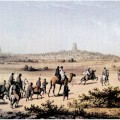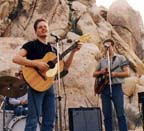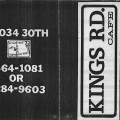(Reporting from Burkina Faso, David Rinck searches for our rock-'n'-roll roots in the landlocked shore of Africa.)
 "Live, travel, adventure, bless, and don't be sorry." — Jack Kerouac
"Live, travel, adventure, bless, and don't be sorry." — Jack Kerouac
To a visitor today to these scrappy, drab concrete towns in the center of West Africa, it's hard to believe that just a century ago this was the epicenter of a magnificent and vital trans-Saharan caravan trade in gold and salt, stretching across the world's greatest desert. Linking Morocco and Mediterranean Europe with the gold kingdoms of the Gulf of Benin, and giving rise to mysterious and fabled cities that were centers of learning and culture, like Gao; Djenne (with its famous UNESCO World Heritage Grand Mosque); and Timbuktu, today the epitome of remote, it was where the Moors built one of Africa's earliest universities and a library famous throughout the Islamic world for its handwritten manuscripts and Korans.
 Likening it to the shore of the vast sand ocean that is the Sahara, south of which lies the Bilad as Sudan, or "land of blacks" (Sudan, means "black" in Arabic), the Arabs named this part of the world the Sahel, or "shore" (the same root from which we take the word for Kenya and Tanzania's national language, Swahili, or "the language of the coast" — Saheli).
Likening it to the shore of the vast sand ocean that is the Sahara, south of which lies the Bilad as Sudan, or "land of blacks" (Sudan, means "black" in Arabic), the Arabs named this part of the world the Sahel, or "shore" (the same root from which we take the word for Kenya and Tanzania's national language, Swahili, or "the language of the coast" — Saheli).
Read moreMali Blues
 The Cardiac Kidz are winding down their 2010 San Diego “Performance Blitz” tour with the end of the year finally in sight. The band has played an unheard of 10 shows in less than six months.
The Cardiac Kidz are winding down their 2010 San Diego “Performance Blitz” tour with the end of the year finally in sight. The band has played an unheard of 10 shows in less than six months.









